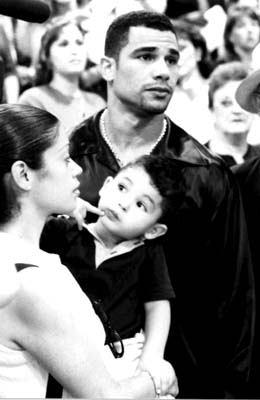Manito
 One of the things I love about living downtown is having so many free events within easy walking distance of my house. Tonight, for example, I wandered over to the library with Maggie Tucker to watch a screening of Manito. Our friend Anna Brandenburg, the reference librarian, hosts the cinema series, and provides popcorn, candy, cookies, and beverages, along with a bit of commentary.
One of the things I love about living downtown is having so many free events within easy walking distance of my house. Tonight, for example, I wandered over to the library with Maggie Tucker to watch a screening of Manito. Our friend Anna Brandenburg, the reference librarian, hosts the cinema series, and provides popcorn, candy, cookies, and beverages, along with a bit of commentary.Manito is a rather grim tale about a Washington Heights Latino family whose hope for the future is snuffed out when little brother Manuel, the first to graduate from high school, shoots a man and ends up in jail. Bye-bye full scholarship to Syracuse Unviersity. His brother, Junior, an ex-con, tries to help him, but ends up killing their father. So now all the men are either dead or in jail, and the women and children are left to shift for themselves.
It's not really a tragedy, because there's no hero with a tragic flaw--pride or what have you. Everyone is just a victim of the crappy environment of Washington Heights. Consequently, there's no catharsis. I found the movie pretty depressing. Not to mention full of the kind of violence I can't bear to watch.
It's interesting that the women seem more capable of handling their crappy lives than the men. When Manito and his friend Marisol are terrorized by thugs on the subway, it's Marisol who pulls out the mace and allows them to escape--and she makes sure they get back Manito's money first. Marisol has the common sense to advise him to remain in her apartment--Manito doesn't listen and ends up in jail. Junior's wife is a responsible wife and mother despite Junior's lies and infidelities.
Manito works as a kind of fictionalized documentary. It's neo-realist cinema: shot entirely on location with a hand-held camera, actors picked from the streets, almost no dubbed soundtrack. The acting is fine, extraordinary at times. The texture of Latino life in Washington Heights is rendered perfectly, as in no big-budget film anyone can name. The movie is invariably compared to Scorsese's Mean Streets.
The best part of the movie night at the library was going out for a bite afterward with Anna and Maggie...sitting in Panera, all warm and cozy, eating, drinking, and trading stories, gifted with a big bag of leftover cookies and brownies by the late-shift clerk, savoring how our lives did not in the least suck.


